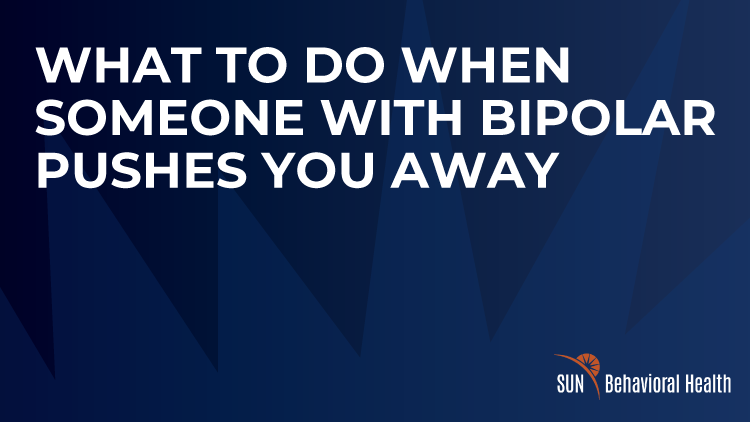Services
- Home
- Mental Health Services
- Who We Treat
- How We Treat
- Patients & Visitors
- About
close

It can feel overwhelming to witness someone you love in pain. It’s harder when they push you away or when you feel like nothing you do is helpful. Bipolar disorder is a complex mental health disorder that causes massive fluctuations in moods. If someone you love has bipolar, they experience overwhelming highs and crushing lows. If they’re pushing you away, chances are, it has nothing to do with you.
At Sun Behavioral Health Houston, we know how important your role is as a friend or a family member of someone with bipolar. Your support and understanding make more of a difference than you think. If you feel defeated because you’re being pushed away, there are some important things we’d like to share with you.
People living with bipolar disorder struggle with episodes of depression and mania. If you’re unfamiliar with these terms, here’s a quick rundown:
Manic episodes are sudden feelings of happiness, invincibility, or high energy. When someone has a manic episode, they’ll usually speak so fast that people will have trouble understanding them. They might be tempted to create lists of unrealistic goals or grand plans. They may get so caught up in their feelings of joy or enthusiasm that they neglect basic needs like sleep or food. This leads to harmful decision-making like spending large sums of money or taking dangerous risks.
When someone is feeling manic, they’ll often drop everything to focus on what’s inspiring them or what plans they need to make. During a manic episode, people may say or do things that are out of character or alarming. Depending on the type of bipolar disorder, manic episodes can last anywhere from a few days to six months.
A depressive episode is the polar opposite of a manic episode. Instead of feelings of happiness and joy, someone experiencing a depressive episode feels hopeless, defeated, and alone. They’ll feel almost no energy, lose interest in their hobbies and friendships, and struggle with crippling self-doubt. A depressive episode can change someone’s personality – they can go from fun-loving and charismatic to irritable and snappy. Self-loathing becomes a prominent part of their life.
Someone who’s experiencing a depressive episode may find it hard to continue working or spending time with family or friends. This puts them at risk for homelessness, substance misuse, or even suicide. Similar to a manic episode, a depressive episode can last anywhere from a couple of days to six or more months.
There Are Different Categories of Bipolar
There are three (main) types of bipolar disorder: bipolar I, bipolar II, and cyclothymic. The type of bipolar someone has can determine how frequently they’ll experience episodic highs and lows. Bipolar I is diagnosed when someone has had at least one manic episode in addition to a hypomanic or major depressive episode. Bipolar II is when someone has major depressive episodes but they don’t experience manic episodes. Cyclothymic disorder is diagnosed when someone has had at least a couple of years of periodic hypomania and depression. Each type of bipolar comes with its own challenges.
There are a number of possible reasons why someone with bipolar would push others away. This tends to happen during depressive episodes, but it can happen when they’re manic or symptom-free, as well. It can be painful when you’re shut out, but it’s not your fault. Here are some reasons why people with bipolar push others away:
Being pushed away from someone you love can feel heartbreaking and frustrating. Fortunately, there are things you can do to help. Here are some of the things you can do or say when someone with bipolar is pushing you away:
At Sun Behavioral Health Houston, our clinicians are experienced in the treatment of bipolar disorder. We’re passionate about helping those with bipolar manage unhealthy emotions, find healthy coping mechanisms, and live happier lives. If someone you love is in need of bipolar treatment, please call us at (713) 796-2273 so we can help!
What do you do when you’re trying to help someone with bipolar disorder, but they’re pushing you away?
Remind them that you’re there for support when they need you. Try not to take anything personally – people with bipolar push others away for many reasons. Respect their boundaries, support them, and gently encourage them to seek treatment. Practice empathy, but avoid empathy burnout.
How do you help someone cope with bipolar disorder?
Practice active listening and pay attention to their needs. Offer to help, but avoid pushing them or giving unwanted advice.